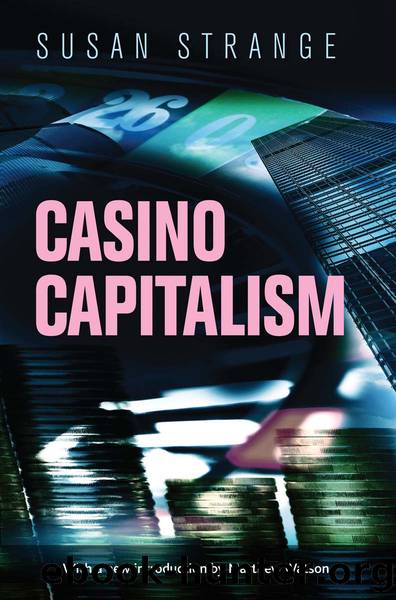Casino Capitalism by Susan Strange;

Author:Susan Strange;
Language: eng
Format: epub
Publisher: Manchester University Press
Conclusion
Thus it seems that agreement on this key weakness is shared chiefly by those at opposite ends of a political spectrum: those who so object to the injustices of capitalism that they want to get rid of it altogether, and those who value so highly the freedom it promises from political tyranny and oppression that they seek to limit the stateâs involvement and thus its power to exploit it. Only those who are most keen to preserve it or to abolish it have eyes sharp enough to spot its weakest point â monetary mismanagement. Between them are to be found a few pragmatists: they are mostly senior officials like Gilbert or Witteveen or Schweizer, with a long practical experience of the deterioration of order in the system. Only rarely are they academics.
The landscape of opinions surveyed in cursory fashion in the preceding pages therefore reveals a panorama dotted with individual names, rather than one strongly patterned with greats blocs of defined schools of thought. Looking backwards, I am struck by the contributions to understanding of highly individual men â Minsky, Mandel, Triffin, Gilbert, Rowthorn â all of them essentially loners. None of them belonged to the great intellectual armies. The landscape of recent opinion therefore resembles not so much a continent divided into great plains and massive mountain ranges as it does an archipelago of volcanic peaks, randomly scattered about in a stormy and unsettled sea of ideas.
In sum, the last decade and more has been marked not by the triumph of coherent economic theories, but by the general appearance of disarray. Considering the vast resources devoted in the Western world in the present century to the development of the study of economics, what is striking is that, instead of a rich harvest of convincing, well-documented explanations, we should find such poverty of theoretical interpretations of contemporary events.
This is surely a big change from the mid-century decades â the 1930s, 1940s and 1950s â when the great mass of expert opinion crowded into the middle ground, applauding the mixed economy and acknowledging the benefits of state intervention. Then, even Presidents of the United States could observe, âWe are all Keynesians nowâ, without anyone thinking it a remarkable statement. Though there were differences about ways and means of demand management, and about degrees of intervention and state support, large areas of agreement remained for this conventional congregation. It formed the intellectual base on which the centre parties of post-war France, Germany and Italy were built. This was where, in America, Democrats and new Republicans could agree, and where in Britain, Conservative and Labour followers of Butler and Gaitskell could comfortably share the hybrid label of âButskellitesâ.
What happened in the 1970s, to judge by this cursory survey of contending interpretations of economic trends, was the totally unexpected impoverishment of this middle ground. It was not that the middle ground became exactly depopulated, for there were many in active politics or in academic economics who lingered there nostalgically. Like peasant farmers, sentimentally attached
Download
This site does not store any files on its server. We only index and link to content provided by other sites. Please contact the content providers to delete copyright contents if any and email us, we'll remove relevant links or contents immediately.
HBRâs 10 Must Reads for Executive Teams (with bonus article âLeadership That Gets Resultsâ by Daniel Goleman) (for True Epub) by Harvard Business Review(460)
Python for Finance Cookbook by Lewinson Eryk;(438)
Empowering Public Speaking by Deanna L. Fasset & Keith Nainby(404)
Doing business with Japan : successful strategies for intercultural communication by Kazuo Nishiyama(385)
Global Orders and Civilizations : Perspectives from History, Philosophy and International Relations by Sadik Unay; Muzaffer Senel(317)
Engaging with Ethics in International Criminological Research by Michael Adorjan Rose Ricciardelli(279)
The Future Internet by Bernard Marr(254)
Intentional Power: The 6 Essential Leadership Skills For Triple Bottom Line Impact by Lisen Stromberg & JeanAnn Nichols & Corey Jones(254)
Analysis of Financial Statements by Frank J. Fabozzi & Frank J. Fabozzi(253)
The Three Skills of Top Trading by Hank Pruden(246)
The Economics of Banking by Jin Cao(245)
Entrepreneurial Marketing by unknow(235)
The Oxford Handbook of Banking and Financial History by Youssef Cassis;Richard S. Grossman;Catherine R. Schenk;(231)
Focus on Teaching by Jim Knight(229)
Data Science and Analytics for SMEs: Consulting, Tools, Practical Use Cases by Afolabi Ibukun Tolulope(215)
Building a Career in Cybersecurity: The Strategy and Skills You Need to Succeed by Yuri Diogenes(215)
Financial Statement Analysis by Martin S. Fridson;Fernando Alvarez; & Fernando Alvarez(212)
New India by Arvind Panagariya(210)
Maximum Success with LinkedIn by Dan Sherman(188)
